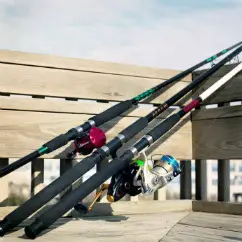How To Pick The Best Bass Fishing Rods
I always wondered if it really made a difference in which bass fishing rods I chose when I was looking to buy my next set up. I just tended to go on size and what kind of reel I was going to use, spinning or bait casting.
I had some basic understanding off all the options but I wanted to fully understand what all the technical terms meant. Things like power and action of a bass fishing rod and how they might affect my fishing.
If there is some sort of an advantage, no matter how small, I wanted to make sure I wasn't missing out.
Skip To:
Composition and Type
Most fishing rods are made of either fiberglass or graphite. Graphite is lighter and stiffer than fiberglass making them the preferred type for most people.
First thing is to make sure you are looking at a rod that is going to fit the type of fishing reel you plan on using. Spin and Bait Casting rods are built differently than a rod for a Spinning reel. If you need to know about reels go back to our Bass Tackle page and you can get that info there.
Spin and Bait casting rods have a place to mount your spin or bait casting reel on top of the rod and can usually be identified by a forefinger grip. They have small guides through which the fishing line is fed. These are considered more powerful than the spinning rods as they can handle heavier line and heavier cover.
On a spinning rod, the spinning reel is mounted below the rod rather than on the top which usually makes for a more comfortable experience. Other characteristics of these fishing rods include a cork or foam handle, line guides that decrease in size from the reel to the tip of the rod. This rod is favored by those that like still fishing with live bait. They can range in size from 5 to 9 feet. Any larger than this are considered to be more of a surf fishing rod.
*Bass Pro Shops has some great deals on bass fishing rods. Check them out by clicking one of the pics below.
Action
As for what is labeled as the action of bass fishing rods, this refers to the responsiveness of the rod and is classified as either fast or slow action. There is no set standard so this is very subjective and can vary from manufacturer to manufacturer.
The faster the action, the higher the point of the bend in the rod. The slower the action, the lower the or closer to the butt the rod will bend.
Fast action rods are more sensitive than slow action. This allows many advantages to the fisherman such as being easier to feel the fish take the lure or bait. The sensitivity also makes it easier to feel what the lure is doing, especially in the case of knowing when the lure has reached the bottom. Fast action also makes it easier to set the hook as less of the rod needs to bend during this action.
Advantages of a slow action rod include a softer, gentler cast. Also they are easier to use with lighter fishing line as they are more forgiving with their greater bend and are less likely to snap your line. Their lack of sensitivity may help the beginning angler from trying to set the hook too quickly and taking the bait away before the bass has had a chance to truly strike.
Power/Weight
The Power or Weight of fishing rods is used to describe the power of the rod as it pertains to the size of the fish it is made to handle.
Manufacturers will typically use a range of anywhere from Ultralight to Extra Heavy to describe the power of a rod. These too can be subjective and vary from each manufacturer.
The easiest way to think about this is to just go for something that describes the size of the bass you are going after. Is it a white bass you are looking to catch, in which a light duty rod will work or are you heading after some stripers and will need that heavy rod.
Lengths
Another area where the choices may seem endless. Drastic differences in lengths indicate fishing rods suited for different environments. Your longer sturdier rods being for surf casting or casting long distances from the bank of a lake. While your shorter medium action/power rods are your typical freshwater fishing gear. And your extra heavy, short rods could generally be used to go after the big fish of the ocean. Since they are thicker and shorter they are ready for the big fight of a strong, big fish.
When comparing rods close in length, it is possible to have two rods labeled as the same weight or power and be different lengths. In this case, go with what you are comfortable with. Longer rods cast farther and are generally more accurate. Shorter rods are easier to control and easier to cast in those tight spaces.
Other things to consider when deciding on any bass fishing rods include the weight of the line it can handle and the lure size it can handle. If you go beyond the stated limits, your bass fishing gear may not fish correctly or worse, you could damage or break your rod.
A lot to consider when you are looking for bass fishing rods and hopefully we were able to shed some light and help out.
Make sure you go check out the rest of the Bass Tackle page for more on your bass fishing gear including what reels to use with these bass fishing rods.
Other articles you may find interesting:
Return from Bass Fishing Rods to the Bass-Fishing-Source home page.


New! Comments
Let us know what you think! Leave us a comment in the box below.